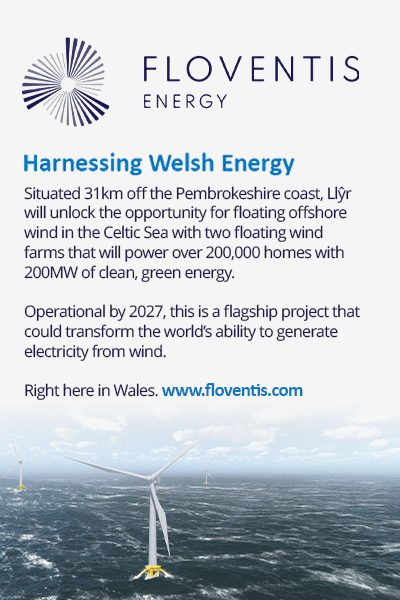Specialist survey vessels are set to embark on a series of studies in the Celtic Sea, after The Crown Estate signed new contracts as part of a programme to gather valuable data which could help support and accelerate the development of new floating wind farms.
The news comes as the UK Government undertakes further work to resolve spatial considerations and policy drivers relating to competing demands on the seabed in the Celtic Sea.
In 2021, The Crown Estate set out plans to explore viable options for a potential leasing opportunity for the first commercial-scale floating wind projects to be located in the Celtic Sea off the coast of Wales and the South West of England. A key part of this approach has been to de-risk the development process as far as possible by undertaking research and engagement to enable a future leasing round and provide a clear pathway to the deployment of floating wind in the UK.
Recently (26th May 2023), The Crown Estate updated developers that, through this engagement, it was clear that the Celtic Sea is subject to many competing demands and there are a number of spatial considerations and policy drivers that the UK Government is now working to resolve.
While this work is underway, The Crown Estate has progressed with the next phase of a multi-million pound programme of technical and environmental surveys in the Celtic Sea. Contracts have now been signed with leading specialists Fugro for geophysical surveys, which are set to get underway in the summer. The survey vessel team will use towed and hull-mounted sensors to collate information on the properties of the seabed and sub-seabed.
As managers of the seabed around England, Wales and Northern Ireland, The Crown Estate has developed a world-leading approach to gathering and sharing marine data and evidence, helping deepen the understanding of the seabed and support the development of a wide range of offshore projects.
Data from these latest studies will not only allow a greater understanding of the properties of the Celtic Sea, but will be a valuable resource for developers as part of the planned leasing round for floating offshore wind. The Crown Estate will make the results of the surveys freely available to successful bidders, helping inform their early engineering design decisions, while also enabling them to take early decisions and manage risk. Developers are also expected to draw on the data to support any future project level Environmental Impact Assessments (EIAs) as part of the planning process.
Nicola Clay, Head of New Ventures for Marine at The Crown Estate, said:
“These surveys will provide a valuable addition to The Crown Estate’s world-leading bank of marine data and evidence, but they also mark an important milestone as we seek to realise the opportunities presented by floating offshore wind.
“The UK seabed is a complex ecosystem of natural habitats and vital industries, of which renewable energy is one part. As managers of this vital resource, a key part of our role is to de-risk offshore renewable projects and help to accelerate their development and the UK’s Net Zero energy transition and energy security as far as possible through engagement with the full spectrum of seabed users.
“We continue to support the UK Government as it considers the competing demands in the Celtic Sea, and look forward to bringing developers together again soon to set out the next steps towards realising the opportunities presented by floating offshore wind.”
The awarding of contracts for geophysical surveys is the latest part of a multi-million pound investment by The Crown Estate in better understanding the physical and environmental properties of the Celtic Sea, with contracts for metocean surveys announced in December 2022.
In addition to the programme of pre-consent surveys, The Crown Estate has also been taking further steps to help accelerate the deployment of floating offshore wind in the Celtic Sea and remove some of the risks and uncertainty developers face. These include:
- Giving developers options to bring forward projects in phases while the technology and supply chains mature.
- Undertaking an integrated spatial design and Plan-Level Habitats Regulations Assessment process ahead of the market tender to reduce timelines and developer risk.
- Working closely with National Grid ESO to ensure this is the first leasing process in the UK to have a coordinated grid connection concept.
About The Crown Estate
The Crown Estate is a significant national landowner with a diverse £16bn portfolio that includes urban centres and development opportunities; one of the largest rural holdings in the country; Regent Street and St James’s in London’s West End; and Windsor Great Park. We also manage the seabed and much of the coastline around England, Wales and Northern Ireland, playing a major role in the UK’s world leading offshore wind sector.
We are a unique business established by an Act of Parliament, tasked with growing the value of the portfolio for the nation and returning all of our net profit to HM Treasury for the benefit of the UK tax payer. This has totalled £3bn over the last ten years.
Through our activities and investments, The Crown Estate creates environmental, social and financial value both for now and into the long term. This includes:
- Playing a significant role in unlocking renewable energy for millions of homes through sectors such as offshore wind and creating opportunities for new technologies like Carbon Capture, Usage and Storage (CCUS) and hydrogen to deliver the UK’s energy security transition, resulting in thousands of jobs for communities across the UK.
- Supporting the sustainable transformation of land use in the UK through diversified, regenerative agricultural and environmental best practice alongside a thriving natural world.
- Becoming recognised as a centre of excellence for environmental and ecological best practice across the Windsor Estate.
- Identifying and creating opportunities for thriving and resilient communities across the country to support regeneration, housing and innovation.
- Ensuring London retains its global city status, by fostering a more vibrant, greener and inclusive destination for millions of visitors and businesses.





